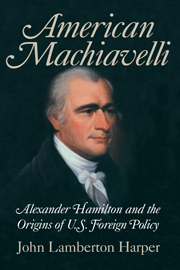Book contents
- Frontmatter
- Contents
- List of Illustrations
- Acknowledgments
- Miscellaneous Frontmatter
- Introduction
- PART I THE COMING OF NECESSITY
- PART II BATTLE LINES ARE DRAWN
- PART III SEIZING THE HELM
- PART IV INFORMAL ADVISER TO THE PRINCE
- 12 Return to Not-So-Private Life, 1794–1795
- 13 “Camillus” into the Breach
- 14 A High-Stakes Game: Washington’s Farewell Address, 1796
- 15 Transition to the New Regime, 1796–1797
- PART V A PRINCE IN HIS OWN RIGHT?
- PART VI THE LESSER OF EVILS
- Conclusion: Hamilton Then and Now
- Notes
- Bibliography
- Index
14 - A High-Stakes Game: Washington’s Farewell Address, 1796
Published online by Cambridge University Press: 05 April 2013
- Frontmatter
- Contents
- List of Illustrations
- Acknowledgments
- Miscellaneous Frontmatter
- Introduction
- PART I THE COMING OF NECESSITY
- PART II BATTLE LINES ARE DRAWN
- PART III SEIZING THE HELM
- PART IV INFORMAL ADVISER TO THE PRINCE
- 12 Return to Not-So-Private Life, 1794–1795
- 13 “Camillus” into the Breach
- 14 A High-Stakes Game: Washington’s Farewell Address, 1796
- 15 Transition to the New Regime, 1796–1797
- PART V A PRINCE IN HIS OWN RIGHT?
- PART VI THE LESSER OF EVILS
- Conclusion: Hamilton Then and Now
- Notes
- Bibliography
- Index
Summary
The Origins of the Farewell Address
The Farewell Address, the most famous state paper in American history, has spawned a vast literature and ongoing controversy. John C. Miller, a discerning scholar, treated Washington and Hamilton as virtual coauthors. Felix Gilbert, in his well-known study, argued that Hamilton left his mark on the central foreign affairs section of the address and turned Washington’s notions into a true “political testament” in the eighteenth-century tradition. The view that Hamilton wrote the address was first advanced by his widow and children, backed by documentary evidence. In 1810, six years after Hamilton’s death, Judge Nathaniel Pendleton (one of the executors of his estate and his second in the duel with Aaron Burr), was dismayed to discover a draft of the address in Hamilton’s handwriting. Pendleton and other Federalists feared that attributing the address to Hamilton would damage Washington’s reputation. He entrusted the relevant bundle of papers to Rufus King, who refused to surrender them until 1826, after being sued by the Hamilton family. The “Hamilton as author” thesis, and a whiff of conspiracy surrounding the matter, has persisted ever since.
There has always been a different view. A prominent diplomatic historian argued that Hamilton’s contribution to the address had been its “incisive style.” For a more recent commentator, the address was “emphatically Washington’s at its intellectual core.” Flexner, who analyzed the question as carefully as anyone, concluded: “The address could correctly be attributed to Hamilton if it expressed Hamilton’s ideas. This it only did insofar as Hamilton’s ideas coincided with Washington’s.” Such was Jay’s view during the original controversy: a “careful perusal” of Washington’s life would convince the skeptics “that the principles of policy which it [the address] recommends as rules for the conduct of others, are precisely those by which he regulated his own.”
- Type
- Chapter
- Information
- American MachiavelliAlexander Hamilton and the Origins of U.S. Foreign Policy, pp. 171 - 179Publisher: Cambridge University PressPrint publication year: 2004



